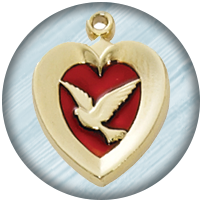NO LONGER THE KINGDOM’S BLIND GUIDE ST. PAUL’S CONVERSION, PART II
Kathy Boh on 17th Jan 2020
NO LONGER THE KINGDOM’S BLIND GUIDE
ST. PAUL’S CONVERSION, PART II
Part I of our series was "CONVERTING FROM
PHARISEE TO FOLLOWER"—the story of St.
Paul’s conversion.
Today’s blog sheds some light on the religious life that
Paul left to become a follower of Jesus Christ.
BLIND GUIDES
“Blind guides” was one of the terms Jesus used to describe the Pharisees. Jesus had many things to say about them because His heart was broken over the ways that they led and cared for God’s (HIS) chosen people. Now, let’s examine Jesus’ comments.
“Woe to you, Scribes and Pharisees, hypocrites! For you… have neglected the weightier provisions of the law: justice and mercy and faithfulness; but these are the things you should have done without neglecting the others. You blind guides, who strain out a gnat and swallow a camel!” [Mt 23:23,24]
One way to paraphrase this verse is to say that their priorities were upside-down and inside-out. They tended to consider the more important things as less important, and the less important as more vital. They tended to care a great deal about how things appeared on the outside, but they failed to develop a good inner life.
Because this meant that so much truth and love and real life-giving teaching did not happen, a “masked” life was presented to others, and presented as an example of “religious life” in place of true, God-led living. Misguided priorities were approved and emphasized. Deceit, craftiness and cunning in such a religious culture as the one Jesus faced subtly became the acceptable order of the day. Life and love and care and humble right living could easily get lost in the shuffle, and “righteousness” and “holiness” could readily become very confused and confusing concepts.
We may wonder how things could have gotten so convoluted and even become the reverse of what is holy and right. There are many, many answers to that. One verse from James may shed some light.
“Where jealousy and selfish ambition [rivalry/contention AMPC—Amplified Bible] exist, there is disorder [strife, disharmony] and every evil [vile. foul, morally degrading] thing [practice].” [James 3:16]
This verse speaks volumes. It was clear throughout the Gospels that the religious leaders were jealous of Jesus’ influence over the Jewish people. It led to their seeking a way to kill Him. Jesus Himself acknowledged that in John chapter 8: “ ‘But as it is, you are seeking to kill Me, a man who has told you the truth, which I heard from God…” And, again: “But the Pharisees went out and conspired against Him, as to how they might destroy Him.” [Mt 12:14]
We sometimes wonder how what we call “serious” or “mortal” sin begins in seemingly “good” or “religious” people. For example, we so often consider “jealousy” a common, “okay” and tolerable attitude—even considering it “acceptable”. Are we overlooking the seriousness of such a choice in attitude or behavior ? Does that tend to lead us in a direction that is different from what God would want? What does God see?
The more we read the James chapter 3 verse and meditate on it, the more applications in life, and understanding of life's problems and answers may come to us.
BLIND LEADING THE BLIND
Jesus recognized that the Pharisees were deaf to much of what He taught, and blind to much of the truth that He spoke. Jesus had another comment about the Pharisees being blind that He gave in answer to a question that they asked Him.
“Then the disciples came and said to Him, ‘Do You know that the Pharisees were offended when they heard this statement?” (Jesus had been speaking to them about what defiles a person.)But He answered and said, ‘…They are blind guides of the blind. And if a blind man guides a blind man, both will fall into a pit.” [Mt 15: 12-14]
GOING TO HEAVEN?
THE KINGDOM OF GOD
THE KINGDOM OF HEAVEN
Many people live their lives hoping and praying that heaven is their destination after this life. Some believe it is like a roll of the dice. Many believe that bowing to our loving, merciful, just Judge—our God and King— means that we live continually wondering what our eternal destination will be. Denominations vary on answers to this sensitive issue. Our objective is not to delve into Protestant vs. Catholic dogmas. There are many good and expert theological resources for that. We simply want to look briefly at some of what Jesus said that may help direct and comfort us. We can also gain much direction on what to avoid as we study some scriptures on what Jesus said makes us stumble, and on what waylays our entrance into His kingdom.
What does Jesus say about heaven— the kingdom of heaven? Earlier we mentioned that the kingdom of God and the kingdom of heaven are somewhat interchangeable concepts. In Parts I and II of out “KINGDOM” series (posted on this website in November, 2019), we spent time describing and looking at what scriptures say about “kingdom” and Jesus as King—and the concept of "king" in general. We found that we can make choices for His kingdom right here, in our own lives. In this blog article, we will take a quick look at the kingdom of heaven and more of what Jesus has to say about it.
What it takes to “go to heaven” is a concept that theologians of all kinds have argued and described and tried to identify for centuries. That is not the task of this series. We will, however, continue to look at the kingdom of heaven (and “of God”) as Jesus and the Bible speak of it. In that way, we can give some description of how we can be part of that kingdom—as we live on earth. For instance, we could be British citizens with allegiance to the Queen of England, and still live in America. We can consider it as that "real", since Jesus described it as “near” and “at hand”, as we saw in the November series articles.
Briefly, those who are part of God’s kingdom are, as scripture describes them: followers of Jesus Christ; they choose Him, going through Him as the “door” of salvation—loving God (or honestly seeking towards it) with their whole hearts. They seek to love God and to love others—as Jesus summed up the Law and the Prophets (see below under “LOVE FROM THE HEART”). They move past “regret” and on to “repentance”: seeking to move toward a change of heart, and, from that, allow the Holy Spirit to help form “good fruit” [Gal 5:22-23] in them. They seek to choose actions that come deliberately from hearts that have chosen to love God first and others at least as much as themselves… or more as God calls them (or us) to do.
What's "more"? It was Jesus Who said in Jn.13:34: "Love one another as I have loved you.". And it was Jesus Who laid His life down in love for us--going way beyond love true "selfless" love.
PHARISEES: HOW DO THEY FIT INTO THE KINGDOM?
W have been mentioning the Pharisees in connection with the religious life that St. Paul turned away from to answer Jesus’ call in his life and ministry. In this blog, we will go into more detail—with many scriptures—showing how they related to the kingdom of God, and why Jesus (and John the Baptist) warned the people about them.
To give a thumbnail sketch:
The Pharisees were very good at detailed and duplicitous religious practice, emphasizing the less important items of their religious law and failing to practice the deeper, foundational and more important aspects of God’s law—particularly love, agape love from the heart toward God and others—according to Jesus’ own words.
There are some social factors that may help offer develop a good seedbed for duplicitous behavior. The more complex that a culture or a religion (in its own sacred devotional “culture” and spiritual life) gets, the easier it is to “look” and “feel” religious. The "appearing" and "feeling" religious can then easily become connected to having a lot of religious things to do that can become like an outward “shell” that appears to be (and feels) pious. Jesus asks for a following from the heart—from deep within. So also did God the Father make that clear through the Psalms and the prophets in the Old Testament when He spoke about the heart.*** (Please see the explanation further on in this posted article.) He also asked us to do acts of love without seeking credit for them. That means that what we do is sometimes or often done unseen by others, or in private. Jesus said not to let the “right hand know what the left hand is doing.”
The Pharisees did not focus on loving deeply. What they did have as their focus were many external religious deeds performed to be highly visible to others. This also fed their own self-righteousness—meeting their own criteria for feeling and appearing to be “good”. They emphasized their preferred traditions over the foundational laws that God had emphasized in the law and through the prophets.
OUR KING: CARING AND PROTECTIVE AS A MOTHER HEN
All the people Jesus came to save, and continually met in everyday life—in the marketplace, in synagogues, etc—were deeply felt by Jesus to be His flock. (He spoke about the Good Shepherd in the gospel of John chapter 10.) All the care and tending of the people/sheep (or lack of tending and care, or lack of meaningful formation and loving, and truth-filled teaching/ “feeding” ) deeply grieved Him.
Jesus told the people:
“The Pharisees have seated themselves in the chair of Moses; therefore all that they tell you, do and observe, but do not do according to their deeds; for they say things and do not do them.” [Mt 23:2]
He was grieved and sometimes angry at what He saw in the Pharisees… how they formed (or mal-formed) the attitudes, minds and hearts of those they led and taught. The Pharisees led the people in directions that too often were not loving… nor did they give the people the new “life” that Jesus desired to bring them. Instead, these teachers of the law put them in danger of ‘absorbing’ the same attitudes and priorities that they had. [See the section marked “LEAVEN OF THE PHARISEES” in PART III of this ST.PAUL’S CONVERSION series.]
Wisdom teaches us that what we learn is as much “caught” as “taught”. Attitudes and perspectives (especially when they come from strong leaders, or highly controlled/ controlling leadership or cultural systems) are particularly vulnerable to being “caught”. If fear or intimidation or guilt are included in the presentation, they become harder to resist. It is no wonder Jesus was concerned.
Jesus knew what His people experienced regarding religious leaders, for He, Himself, had had much religious training. Even at 12 years old, He had deeply impressed the religious leaders in the temple. (Luke 2:41-52) Remember when He was “lost” and spending time there, after his parents were traveling home thinking He was with them?
Jesus had multiple concerns: Not only were the Pharisees NOT caring for His sheep well, and not leading them toward love of God and others, nor helping them to do so, but they were keeping them from recognizing Who Jesus really IS, so that they could turn to Him and be saved, tended and well-formed.
“I am the Good Shepherd. A good shepherd lays down his life for the sheep.” [Jn 10:11]
He also used the analogy of a mother hen:
“Jesus mourned and grieved over Jerusalem. He said, ‘Jerusalem, Jerusalem, who kills the prophets and stones those who are sent to her! How often I wanted to gather your children together, the way a hen gathers her chicks under her wings, and you were unwilling’.” [Mt 23:37]
LOVE FROM THE HEART—TOWARD GOD AND OTHERS
The love from the “heart”*** that Jesus described is not the same as an emotional reaction of love, as our culture often sees it. It is agape love. The love Jesus asks for is a truly unselfish choice that comes from deep within. Choosing to love God, as Jesus taught, was described from early in God’s relationship with His people, Israel. That kind of love is a major life-choice—and it’s part of living in the kingdom. “Moving” to the kingdom of God is as real and significant a choice as… say… moving to another neighborhood or state or country. The difference is, it's our hearts and minds that move, and our wills that consent. The changes are more internal, and not necessarily acted out with great fanfare. There is a new way of life to be learned, chosen and lived. Yet, we walk it out very much in this world.
“ ‘You shall love the Lord, your God, with all your heart, with all your soul and with all your mind’. This is the greatest and the first commandment. The second is like it: ‘You shall love your neighbor as yourself’. The whole law and the prophets depend on these two commandments.” Mt 22:37-40]. There is no greater commandment greater than these.” [Mark 12:31]
We are particularly to love and give care to the “least” and those in need, as many scriptures show. [see Mt 25:45-46] Scripture also tells us that if we do not love the brother (whom we see) then we cannot say that we love God (whom we do not see).
The parable of the Good Samaritan shows us that, even when we are religious leaders or we minister in some way, we are still called to humble loving service. Even if we are on our way to “church”, we still need to prioritize loving compassion towards a stricken, injured, needy, unattended one—however inconvenient the timing is to our busy, important, religiously driven schedules. At least, that is one thing this parable from Jesus seems to say. For it was both a “priest” and a “Levite” that Jesus used as an example in the parable. They both saw the wounded, needy man on the road and passed by on the other side without helping him. (Luke 10:25-37)
Jesus spoke about what comes from the heart ***in the book of Matthew:
“…The things that proceed out of the mouth come from the heart, and those defile the man. For out of the heart come evil thoughts, murders, adulteries, fornications, thefts, false witness, slanders. These are the things which defile the man; but to eat with unwashed hands does not defile the man.” [Mt 15:18-20]
Washing hands was part of Hebrew religious practice. But to fail to do even this wise and common religious ritual did not define the man as unholy. Jesus referred to the heart to show that God sees deeper than superficial actions. And He sees and judges what is more and less important and necessary.
In first two parts of the “KINGDOM” series mentioned above, we gave scriptures about entering the kingdom of God— coming to Jesus to follow Him, and making Him King of our lives. In part, this involves hunger and seeking; humility; repentance and choosing to change; desiring the truth and new way in life— to find the Way, Truth and Life; etc.
“The king will say, ‘Inherit the kingdom prepared for you by my Father… for I was hungry… thirsty… a stranger… naked… ill… in prison… and you fed me… gave me drink…welcomed me… clothed me… cared for me’… The king will reply, ‘I tell you, whenever you did… you did it for me!” [Mt 25:34-40]
WHAT HINDERS US FROM THE KINGDOM?
What about the opposite?
“ ‘I was a stranger… naked… sick…in prison… but you would not take care of me.’… The king will reply, ‘I tell you whenever you refused to help one of these least important ones, you refused to help me.’ “ This time, Jesus directly and plainly connected the kingdom of heaven with the reality of going to heaven or hell. “… and these will go off into eternal punishment [prepared for the devil and his angels] but the righteous to eternal life.’“ [Mt 25:41,43,45,46]
Again, much has to do with our hearts. Jesus knows that we will love and prefer some things and some people in this world over some others, but He is speaking to what we love "more" and "most". "Idolatry" is, basically, loving anything more than God, or putting something in place of God. That gets in the way of important life-choices.
“How hard it is for those who have wealth to enter the kingdom of God!... It is easier for a camel to pass through [the] eye of [a] needle than for one who is rich to enter the kingdom of God.” [Mk 10:23-25]
“The Pharisees, who loved money, heard all these things and sneered at him. And he said to them, “You justify yourselves in the sight of others, but God knows your hearts***; for what is of human esteem is an abomination in the sight of God.” [Luke 16:14-15]
Before we end, let’s look at one more warning Jesus gave that kept God’s people from coming to Him as Lord and entering His kingdom.
Jesus often warned about the Pharisees, Sadducees and Publicans. He gave many examples of why the people should not follow their example. All the religious deeds that they carefully practiced would not add up to a heart that was right with God— unless God saw real love there. One warning was this:
“And Jesus said to them, ‘Watch out and beware of the leaven of the Pharisees and Sadducees.’” [Mt 16:6]
What exactly did they do to be considered undesirable leaven by Jesus? We go into more detail on leaven in the next blog article, “WHAT EXACTLY IS A PHARISEE?”, PART III of our ST. PAUL’S CONVERSION series. There we will get into more destructive and insidious patterns of leaders that came against Jesus’ desire to “mother hen” and “shepherd” God’s people, and the life and peace and salvation that He came to bring.










